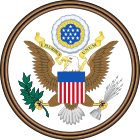Enforcement Act of 1870 facts for kids
 |
|
| Long title | An Act to enforce the Right of Citizens of the United States to vote in the several States of the Union, and for other Purposes. |
|---|---|
| Nicknames | Civil Rights Act of 1870, Enforcement Act, First Ku Klux Klan Act, Force Act |
| Enacted by | the 41st United States Congress |
| Citations | |
| Statutes at Large | 16 Stat. 140-146 |
| Legislative history | |
|
|
| United States Supreme Court cases | |
| United States v. Reese (1876) United States v. Cruikshank (1876) United States v. Allen Crosby United States v. Robert Hayes Mitchell |
|
The Enforcement Act of 1870 was an important U.S. federal law passed on May 31, 1870. It is also known as the Civil Rights Act of 1870 or the First Ku Klux Klan Act. This law gave the President the power to make sure the Fifteenth Amendment was followed across the country.
The Fifteenth Amendment, passed in 1870, said that the right to vote could not be denied based on race, color, or if someone had been a slave. The Enforcement Act was created to protect these new voting rights. It was one of three similar laws passed during the Reconstruction Era (1865-1877). These laws aimed to stop attacks on the voting rights of African Americans. These attacks came from state officials and violent groups like the Ku Klux Klan.
Contents
What Did the Act Do?
The Enforcement Act of 1870 made it illegal for state officials to stop people from registering to vote because of their race or if they had been enslaved. It set up punishments for anyone who tried to interfere with a person's right to vote. This law also gave federal courts the power to make sure the act was followed.
Protecting Voters' Rights
The act allowed the President to use the army to uphold the law. It also let federal marshals bring charges against people who committed election fraud. This included bribing or scaring voters. It also covered groups that worked together to stop citizens from using their constitutional rights.
Stopping Violence and Intimidation
A key part of the act was banning the use of terror, force, or bribery to prevent people from voting because of their race. This was especially important in the Southern states after the American Civil War. The law directly targeted groups like the Ku Klux Klan.
Impact on the Ku Klux Klan
The Enforcement Act, along with other laws, helped to fight against the Ku Klux Klan. Many Klan members were caught and faced consequences for their actions. Because of these federal efforts, the first Ku Klux Klan group was largely stopped within about a year.
 | William L. Dawson |
 | W. E. B. Du Bois |
 | Harry Belafonte |

